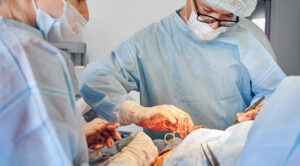In India, we often turn to home remedies—“ghar-ke-nuske”—for everyday health issues. While these solutions can help in minor cases, persistent digestive problems require expert attention. If you’re experiencing frequent constipation, abdominal pain, rectal bleeding, or trouble swallowing, it’s important to consult a surgical gastroenterologist.
What is Surgical Gastroenterology?
Surgical gastroenterology is a specialized medical field that focuses on diagnosing and treating disorders of the digestive system that may need surgical intervention. This includes conditions affecting the entire gastrointestinal (GI) tract—esophagus, stomach, small intestine, large intestine, liver, gallbladder, pancreas, and rectum.
Surgical gastroenterologists are trained to perform both simple and complex surgeries to manage GI diseases, including GI cancers, hernias, gallstones, and more.
Who is a Surgical Gastroenterologist?
A surgical gastroenterologist—often known as a GI surgeon or GI specialist—is a doctor who specializes in performing surgeries on the digestive system. In India, the path to becoming a surgical gastroenterologist includes:
- Completing an M.B.B.S. degree
- Earning an M.S. (General Surgery) degree (3 years)
- Completing a super-specialty course (3 years) such as DNB or MCh in Surgical Gastroenterology
- Registering with the Medical Council of India (MCI)
Only doctors with valid DNB/MCh degrees and MCI registration can be called surgical gastroenterologists in India.
Surgical gastroenterologists are highly skilled in treating all types of gastrointestinal diseases, especially conditions that require surgery such as GI cancers, severe reflux, tumors, and chronic digestive issues.
How Are GI Surgeries Performed?
Surgical gastroenterology uses three main approaches for treatment:
1. Traditional Open Surgeries
Open surgeries involve making a larger incision to access the organ directly. This approach is used for major operations, including cancer removal or complicated GI conditions.
2. Laparoscopic (Minimally Invasive) Surgery
Laparoscopy uses very small incisions and a laparoscope (a camera-guided instrument) for “keyhole” surgeries. This technique leads to faster recovery, minimal pain, and less scarring.
3. Robotic Surgery
Robotic surgery enables greater precision. A robotic arm, controlled by the surgeon, is used to perform intricate procedures through small incisions, offering advanced accuracy and faster healing.
When Should You Visit a Surgical Gastroenterologist?
Don’t ignore persistent digestive symptoms. Consult a surgical gastroenterologist if you have:
- Frequent stomach aches or abdominal pain
- Stomach tumors or abnormal swelling
- Regular acidity, heartburn, or strong acid reflux
- Difficulty swallowing food
- Blood in stools, sticky/black stools
- Unexplained weight loss or loss of appetite
- Yellowing of skin (jaundice)
- Anemia
These symptoms may indicate serious underlying issues such as GI cancers, liver disease, or other complex digestive disorders. Early consultation ensures timely diagnosis and effective treatment.
Why is Surgical Gastroenterology Important?
Surgical gastroenterology combines advanced medical knowledge with skilled surgical care to treat complex diseases of the digestive system. Whether managing cancer, performing minimally invasive surgeries, or treating chronic GI problems, a qualified GI surgeon ensures the best outcomes for patients.
Meet an Expert Surgical Gastroenterologist in Gujarat
If you or your loved one is suffering from long-standing digestive issues or has been diagnosed with a GI disorder, consult a trusted surgical gastroenterologist.
Dr. Jay Chokshi, South Gujarat’s first National Board-certified GI and HPB surgeon, offers advanced care for all gastrointestinal diseases and cancers.
Take the first step towards a healthier digestive system. Book your appointment with Dr. Jay Chokshi today!





